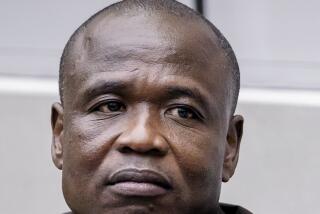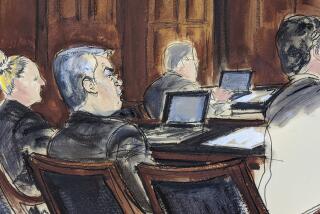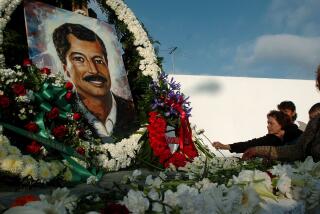Guatemalan court action revives questions about Rios Montt’s fate
MEXICO CITY— The Guatemalan high court’s decision to overturn the genocide conviction of former military dictator Efrain Rios Montt and restart his trial has revived questions about his responsibility for the slaughter of some 1,700 ethnic Maya people.
The ruling late Monday, which overturned Rios Montt’s May 10 conviction, also raised questions about the kind of trial Rios Montt will now have and about a judicial system that has long been considered weak, corrupt, prone to impunity and susceptible to pressure from powerful outside forces.
Rios Montt was Guatemala’s ruler for 17 months in 1982 and 1983, one of the bloodiest periods of a multi-decade civil war that pitted Marxist guerrillas against conservative government forces. Thousands of Guatemalans, including many poor, indigenous campesinos, either chose sides or were fatally caught, as writer David Stoll once put it, “between two fires,” and suffered at the hands of one or the other.
A three-judge panel this month found Rios Montt, 86, guilty of genocide and crimes against humanity, sentencing him to 80 years in prison after a dramatic two-month trial. The court proceedings were closely followed by liberals and a number of international human rights groups, who cheered the decision and described it as an example of a Guatemalan court system capable of doing the right thing.
“The conviction of Rios Montt sends a powerful message to Guatemala and the world that nobody, not even a former head of state, is above the law when it comes to committing genocide,” said Jose Miguel Vivanco, Americas director at Human Rights Watch, in a statement shortly after the verdict. “Without the persistence and bravery of each participant in this effort -- the victims, prosecutors, judges and civil society organizations -- this landmark decision would have been inconceivable.”
Monday’s 3-2 decision by the Constitutional Court calls on the trial court to rehear the case beginning from where it stood April 19. The three high court judges who overturned the conviction essentially supported lower court rulings that Rios Montt was denied his due process rights when the judges who convicted him briefly kicked his attorney out of the courtroom, leaving him to be defended for several hours by a co-defendant’s lawyer.
The ruling also suspends the trial until other pending challenges raised by Rios Montt’s defense team can be resolved, according to Emi McLean, an attorney with the Open Society Justice Initiative, who has followed the case with other observers on the website www.riosmontt-trial.org.
One key question is whether the same three-judge panel that issued the forceful, unanimous ruling against Rios Montt will be allowed to remain on the case.
Rios Montt’s attorney, Francisco Garcia Gudiel, told the Guatemalan newspaper Prensa Libre that the judges should be disqualified because they have already issued an opinion.
If Rios Montt’s attorneys are able to get the case heard by a different set of judges, human rights observers and liberals will almost certainly question whether justice is being served. The high court’s ruling Monday already has some observers wondering if the wealthiest and most powerful forces in Guatemala are once again manipulating the system to achieve the results they want.
“The method of avoiding justice in Guatemala has never been exclusively by the use of illegal force,” said Douglass Cassel, a Notre Dame law professor and human rights law expert who has represented victims of Guatemalan violence in the Organization of American States’ inter-American human rights justice system. “The legal systems in many Latin American countries in general, and in Guatemala in particular, for decades have been skewed in favor of the powerful and against the weak.
“In this case, in a very general way, you had enough forces to get a case going and carry it through, but they were up against very well-resourced Guatemalan lawyers who know how to work the system in support of their client.”
Some of Guatemala’s most powerful public voices have criticized the case and the ruling, including the country’s national business council. President Otto Perez Molina, who commanded troops in the area where the massacres occurred, has stated that genocide did not occur during the civil war. Observers say that bumper stickers to that effect have shown up on the back of some Guatemala City cars.
Cassel said he had no proof that outside forces were meddling in the judicial process but that he wouldn’t be surprised if they were.
“We’re only looking at the surface of what’s going on here,” he said. “One would have to be extremely naive to take everything a Guatemalan court does at face value.”
Some of Rios Montt’s supporters have contended that the trial was an attempt by the Guatemalan left to seek vengeance against the country’s conservatives, and they hold out hope that the ruling means the ex-general will get a fair trial this time.
A Prensa Libre editorial noted that the high court’s ruling should be viewed as neither a “victory nor a defeat,” but rather an example of the Guatemalan courts defending the rights of the accused.
“The legal battle will resume,” the editorial said, “and it is hoped that the participants … will act without being shown to be partial.”
ALSO:
Russia says it was robbed in Eurovision song contest
President Obama to meet China’s Xi Jinping in California
Jailing of Afghan women for ‘moral’ crimes is increasing, group say
richard.fausset@latimes.com
Cecilia Sanchez of The Times’ Mexico City bureau contributed to this report.
More to Read
Start your day right
Sign up for Essential California for news, features and recommendations from the L.A. Times and beyond in your inbox six days a week.
You may occasionally receive promotional content from the Los Angeles Times.






